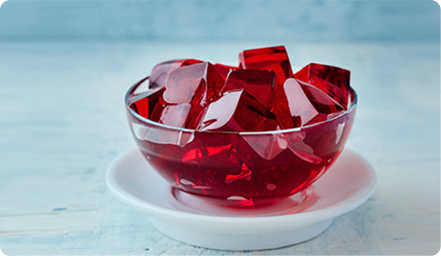-
July, 26,2025
Understanding the Role of Bloom Strength in Soft Gelatin Capsules
-
July, 25,2025
Bloom Strength and Its Impact on Hard Gelatin Capsules
-
July, 21,2025
How Gelatin Is Revolutionizing Pet Food: A Healthier Option for Dogs
-
June, 22,2025
Collagen as a Trusted Ingredient: Meeting Global Demand with Reliable Supply
What is Beef Gelatin? What is it Made of?
Beef gelatin is a widely used natural ingredient known for its exceptional gelling and stabilizing properties. But what exactly is beef gelatin, and what is it made of? In this guide, we explore its origins, production process, applications, and key differences from other gelatin types. Whether you are a food manufacturer, product developer, or simply curious, understanding beef gelatin can help you choose the right solution for your needs.
What is Beef Gelatin?
Definition and Key Characteristics
Beef gelatin is a natural protein derived from the collagen found in cattle hides, bones, and connective tissues. Through a careful extraction process, this collagen is transformed into a versatile substance prized for its thickening and gelling properties.
Typically, beef gelatin is available in several forms, including fine powder, thin sheets, or granules. It is generally colorless or pale yellow, odorless, and tasteless, making it easy to incorporate into various recipes and products without altering their original flavor or appearance.
Thanks to its unique molecular structure, beef gelatin can create firm gels or add elasticity and smoothness to foods and other formulations. These characteristics have positioned it as a vital ingredient across multiple industries, especially in food, pharmaceuticals, and cosmetics.
As a leading edible gelatin supplier, Funingpu specializes in producing high-quality beef gelatin tailored for food and pharmaceutical applications.
How Beef Gelatin Works
Source: https://images.app.goo.gl/cJDsJbFZw6Xn47Ck8
The functionality of beef gelatin is rooted in its ability to absorb water and form a three-dimensional network as it cools. When dissolved in hot water, gelatin molecules disperse and break apart. Upon cooling, they re-associate into a semi-solid gel matrix, trapping the water inside and giving the mixture its structure.
One of beef gelatin's standout features is its thermal reversibility: It melts when heated and solidifies when cooled. This property makes it perfect for culinary applications like jelly and mousse and is critical in pharmaceutical and biomedical products requiring temperature-sensitive formulations.
What is Beef Gelatin Made Of?
Main Raw Materials
Beef gelatin is made primarily from the collagen-rich parts of cattle, including hides, bones, and connective tissues. These materials are natural sources of Type I and Type III collagen, the primary structural proteins responsible for strength and elasticity in animal tissues.
During gelatin production, only selected, high-quality raw materials are used to ensure the purity and safety of the final product. Cattle hides, in particular, are valued because they contain a dense concentration of collagen fibers with minimal fat or other unwanted components. Similarly, bovine bones and cartilaginous tissues provide a robust collagen source ideal for high-bloom gelatin used in industrial and pharmaceutical applications.
The sourcing process typically prioritizes animals that meet strict veterinary standards, with many manufacturers offering beef gelatin that is traceable, certified, and compliant with food-grade or pharmaceutical-grade requirements.
Manufacturing Process Overview
The production of beef gelatin involves several precise stages designed to extract collagen while preserving its functional properties:
- Pretreatment
- Raw materials undergo pretreatment to remove impurities such as fats, minerals, and non-collagenous proteins.
- Depending on the type of raw material and desired end use, either acid treatment (commonly for hide-derived gelatin) or alkaline treatment (commonly for bone-derived gelatin) is employed. These treatments break down complex structures and prepare collagen for extraction.
- Raw materials undergo pretreatment to remove impurities such as fats, minerals, and non-collagenous proteins.
- Hydrolysis and Extraction
- The pretreated materials are subjected to controlled heating in water to extract collagen.
- Heat and time parameters are carefully managed to partially hydrolyze the collagen into gelatin without degrading its molecular weight too much, preserving optimal gel strength.
- The pretreated materials are subjected to controlled heating in water to extract collagen.
- Purification and Drying
- The extracted gelatin solution is filtered, concentrated under vacuum, sterilized at high temperature, and then dried into a powder or sheet form.
- This ensures the gelatin is microbiologically safe, neutral in taste and odor, and easy to store and transport.
- The extracted gelatin solution is filtered, concentrated under vacuum, sterilized at high temperature, and then dried into a powder or sheet form.
The final product is a pure, versatile gelatin that can be used across culinary, pharmaceutical, and industrial applications, offering superior gelling, stabilizing, and binding properties.
At Funingpu, a trusted gelatin manufacturer, we ensure strict quality standards from sourcing to final production to deliver safe, reliable gelatin solutions.
Common Applications of Beef Gelatin
Food Industry Uses
Beef gelatin plays a vital role in the food industry due to its exceptional gelling, thickening, stabilizing, and emulsifying properties. It is widely used in:
- Gummies and Marshmallows: Providing the elastic, chewy texture that defines candies like gummy bears and traditional marshmallows.
- Jellies and Desserts: Acting as the primary gelling agent in fruit jellies, panna cotta, mousse, and aspic dishes.
- Dairy Products: Improving the texture and stability of yogurts, cream cheeses, and some frozen desserts.
- Beverage Clarification: In the wine and juice industries, beef gelatin is sometimes used as a fining agent to clarify liquids by binding with suspended particles.
Because it is neutral in taste and odor, beef gelatin integrates seamlessly into recipes without altering the intended flavor profile, making it a versatile and indispensable ingredient for food manufacturers. Funingpu offers gelatin powder wholesale options to meet the diverse needs of confectionery, dairy, and functional food manufacturers.
Pharmaceutical and Nutraceutical Uses
In the pharmaceutical and nutraceutical sectors, beef gelatin is valued for its film-forming and encapsulating abilities. Key applications include:
- Soft and Hard Gelatin Capsules: Beef gelatin forms the shell of many medicinal capsules, protecting active ingredients and enabling controlled release.
- Tablet Binding and Coating: It acts as a binder in tablets and as a coating material to improve swallowing and preserve ingredient stability.
Pharmaceutical-grade beef gelatin must meet stringent purity, safety, and functional standards to ensure product consistency and consumer protection. At Funingpu, we provide pharmaceutical-grade gelatin that meets international standards, offering reliable solutions for capsule manufacturing, tablet coating, and other medical applications. As a professional gelatin manufacturer, Funingpu gelatin is trusted by global clients for its stability, traceability, and consistent performance.
Other Industrial Uses
Beyond food and pharmaceuticals, beef gelatin finds application in several industrial sectors:
- Photography: Traditional photographic films and papers use gelatin as a suspending medium for light-sensitive compounds.
- Matchstick Production: Gelatin serves as a binder for the combustible heads of matches.
- Adhesives and Glues: Gelatin is a key component in specialty adhesives used for woodworking, bookbinding, and archival materials.
These diverse uses highlight the versatility of beef gelatin and its importance across a wide range of industries beyond its culinary origins.
Is Beef Gelatin Halal or Kosher?
Importance of Certification
For consumers who observe religious dietary laws, knowing whether beef gelatin is halal or kosher is crucial.
Halal beef gelatin must be sourced from cattle that have been slaughtered following Islamic principles (Zabiha method) and must not involve any forbidden substances throughout the production process. Similarly, kosher beef gelatin must come from animals slaughtered under strict Jewish dietary regulations, and the entire production line—from raw material handling to final packaging—must be supervised by an authorized kosher certification agency.
Without proper certification, standard beef gelatin may not meet halal or kosher standards, even if it is derived from cattle, due to potential cross-contamination, improper slaughtering methods, or the use of non-compliant additives during manufacturing.
For manufacturers targeting global markets, obtaining halal and kosher certifications is essential to expand their product reach and meet the needs of Muslim and Jewish consumers.
Differences in Market Offerings
There are significant differences between regular, halal-certified, and kosher-certified beef gelatin:
- Regular Beef Gelatin: Made from cattle but without specific religious slaughtering or handling requirements. It may be acceptable to general consumers but not to those following strict halal or kosher dietary laws.
- Halal Beef Gelatin: Strictly adheres to Islamic guidelines, ensuring no cross-contamination with forbidden substances and that slaughtering practices meet halal standards.
- Kosher Beef Gelatin: Produced under Jewish dietary laws, which may include stricter handling and inspection processes, especially regarding animal health and processing environments.
Consumers seeking certified beef gelatin should always look for recognizable halal or kosher certification logos on product packaging to ensure compliance with their dietary preferences. Funingpu gelatin products are available with halal and kosher certifications, ensuring they meet the strictest religious dietary standards for global markets.
Comparison: Beef Gelatin vs Other Gelatin Types
Beef Gelatin vs Pork Gelatin
|
|
|
|
|
|
|
|
|
|
|
|
|
|
|
|
|
|
|
|
Beef Gelatin vs Collagen Peptides
|
|
|
|
|
|
|
|
|
|
|
|
|
|
|
|
|
|
|
|
Final Thoughts
Beef gelatin is a highly versatile ingredient valued for its gelling, stabilizing, and texturizing properties across food, pharmaceutical, and industrial sectors.
At Funingpu, we specialize in providing premium beef gelatin solutions, including halal-certified and kosher-certified options. As a trusted gelatin manufacturer, we are committed to delivering safe, high-quality products tailored to meet the diverse needs of our global clients.
Explore how Funingpu gelatin can support your next innovation with reliable sourcing and technical expertise.
Phone: +86-577-88105990
Mobile: +86-138 5886 1938
Official Website: www.fnp-gelatin.com
Email: sales@funingpu.com
Address: No. 1-10 Wenpu Road, Yacheng Town, Xiapu County, Ningde City, Fujian Province




